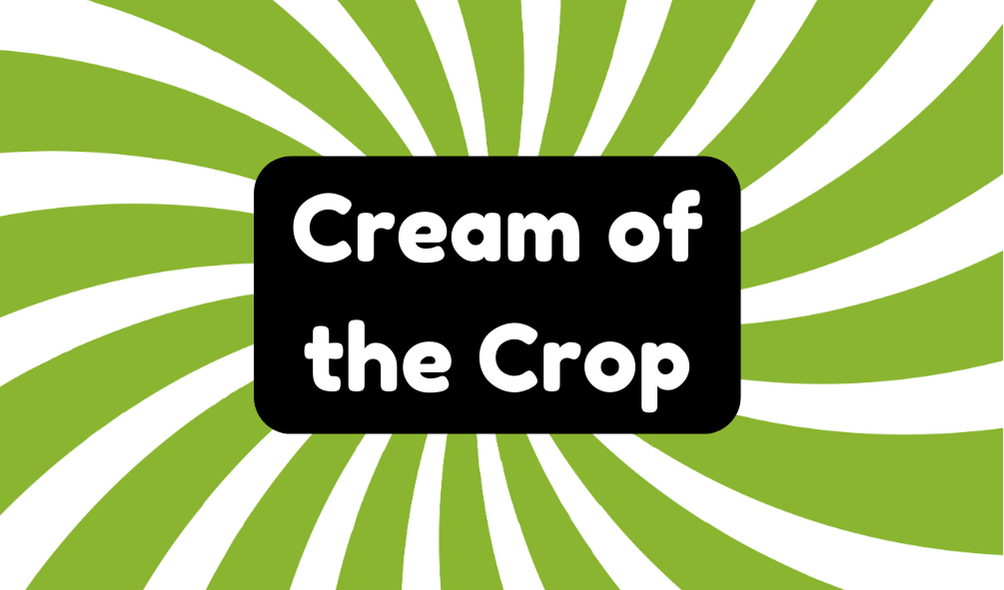The phrase "cream of the crop" refers to the top-quality or elite status of individuals or items, often suggesting exclusivity. Its origins lie in French culture, where "crème de la crème" emphasizes superior quality. The term raises questions about social hierarchies and cultural elitism. While it marks high standards, it can also hint at unattainable goals for many. This concept remains relevant today, reflecting societal divides in areas like education and luxury goods. Further insights reveal more about its implications.
Synonyms
Synonyms for "crème de la crème" highlight the exclusivity and high status associated with the term. This expression often encompasses an elite selection of individuals or products that stand out above others. Among the alternatives, three particularly relevant synonyms emerge:
- Top-tier – indicating the highest quality or rank.
- Premier – suggesting a position of great importance or prestige.
- Exclusive – implying limited access to only a select few.
Such terminology reinforces the idea of prestigious accolades, yet it invites skepticism regarding the inherent elitism and social distance they encapsulate. Understanding these nuances is essential.
Example of Sentences
When discussing the concept of "crème de la crème," it is useful to provide practical examples that illustrate its meaning in everyday contexts. Consider these instances:
- The children of the social elite attend this prestigious school, where tuition costs reflect cultural elitism.
- Membership in the exclusive club is reserved for crème de la crème individuals, reinforcing social hierarchies.
- Promises of top-quality from the luxury brand were expected to be crème de la crème, yet failed to deliver results.
These examples highlight how the phrase signifies both exclusivity and the often unattainable status associated with the highest echelons of society.
Origin
The phrase "crème de la crème," while often associated with luxury and exceptional quality, has its roots deeply embedded in French culture. Its literal translation signifies "the cream of the cream," pointing to elite status and exclusivity. Historically, cream was a luxury item primarily enjoyed by the wealthy, revealing a societal divide reflected in cultural contexts. Such historical implications highlight the term's evolution from a food-related descriptor to a broader marker of superiority in various fields. This transformation raises questions about equality and access, reminding us that what seems prestigious may also emphasize disparity in our contemporary society.
Collocations
Following its rich historical context, "crème de la crème" has found a variety of collocations that further anchor its meaning in modern language. Such phrases help to convey the exclusivity and desirability associated with elite status. Common collocations include:
- Exclusive experiences that promise unparalleled engagement.
- Elite education settings, often limited to a select few.
- High-end products marketed as crème de la crème.
While these terms elevate an entity's status, they can also perpetuate divisions, raising questions about accessibility and authenticity. Therefore, while the allure of being crème de la crème is undeniable, it often reinforces a reality that not everyone can attain.
How to Use in Everyday Language
Using the term "crème de la crème" can enhance conversations, yet it may also introduce an air of pretentiousness. To use it effectively in everyday language, one can reference the crème de la crème lifestyle or mention crème de la crème brands. Below is a table to illustrate appropriate contexts:
| Context | Example Use |
|---|---|
| Fashion | "These shoes are crème de la crème." |
| Education | "She studies at a crème de la crème university." |
| Hospitality | "This hotel offers a crème de la crème experience." |
| Cuisine | "This restaurant serves crème de la crème dishes." |
| Events | "The gala showcased the crème de la crème of talent." |
Users should remain aware of the potential for elitism.
Why Is It Still Relevant Today?
Why does the concept of "crème de la crème" continue to resonate in contemporary society? This phrase embodies cultural perceptions of elitism and prestige, serving as a marker for high status and quality. In modern implications, it reflects ongoing social stratification, often used in marketing to elevate products and experiences, suggesting they are superior. Despite a push for inclusivity, the allure of exclusivity remains strong, driving consumers to seek the best, often at significant costs. Ultimately, while society evolves, the desire to identify and aspire to the "best of the best" endures, highlighting the complexities of status and value.







